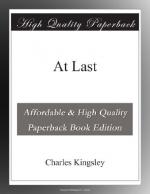“It is Christmas night, my love, and the poor fellow is excusable. He showed excellent taste. It was a very pretty scene. I shall not soon forgive myself for throwing it into such ‘admired disorder.’ Miss Scott”—[to a musical spinster]—“may I tax your politeness so far as to ask you to take my seat at the piano? I must go to my room for a few minutes,” raising her finger smilingly to her displaced ivy wreath. “If you would testify your tolerance of my folly, please go on with your amusement. I shall be encouraged to return when I hear the music.”
Her collected, urbane self once more, she took her husband’s arm, and passed through the opening ranks of her friends, bowing to this side and that, with apologetic banter and graceful words of regret—still very pale, but changed in no other respect.
“A singular episode in an evening’s entertainment,” said Mr. Dorrance, leading Mabel to her stand in the re-forming set. “I never knew Clara to succumb before to any type of syncope or asphyxia. She is a woman of remarkable nerve and courage. And, by the way, how preposterous is the common use of the word ‘nervous.’ The ablest lexicographers define it as ‘strong, well-strung, full of nerve,’ whereas, in ordinary parlance, it has come to signify the very opposite of these. When I speak of a nervous speaker or writer, for example, what do I mean?”
“One who imbibes unwholesomely large quantities of strong green tea, and sees hobgoblins peering at her through the window-panes!” said Rosa, sarcastically artless, tripping by in season to overhear this clause of his small-talk.
Mabel’s imperturbable good-breeding prevented embarrassment or resentment at the interruption. At heart, she was vexed that Rosa should omit no opportunity of shooting privily and audaciously at her practical admirer, but to betray her appreciation of the impertinence would be to subject herself to imputations of sensitiveness on his account.
“I saw the hobgoblin without the aid of green tea,” she rejoined. “There was really some one upon the porch, but why the apparition should scare Clara out of her wits, I cannot divine. The negro is an incurable Paul Pry, and, next to dancing a Christmas jig himself, is the pleasure of seeing others do it.”
Mrs. Aylett verified her brother’s encomium upon her nerve by reappearing in the saloon by the time another set was over, and just before the announcement of supper, radiant and self-possessed, prepared to do double social duty to atone for the fright she had caused, and the temporary damp her swoon had cast over the festivities.
The revel went joyously forward—Christmas-games and incantations, the dexterous introduction, by a jocose old gentleman, of a mistletoe-bough into the festoons draping the chandelier, and divers other tricks, all of which were taken in excellent part by the victims thereof, and vociferously applauded by the spectators. The great hall-clock had rung out twelve strokes, and two or three methodical seniors were beginning to whisper to one another their intention to take French leave of the indefatigable juniors and seek their couches, when a continued tumult arose from the yard—barking and shouts, and voices in angry or eager dispute.




